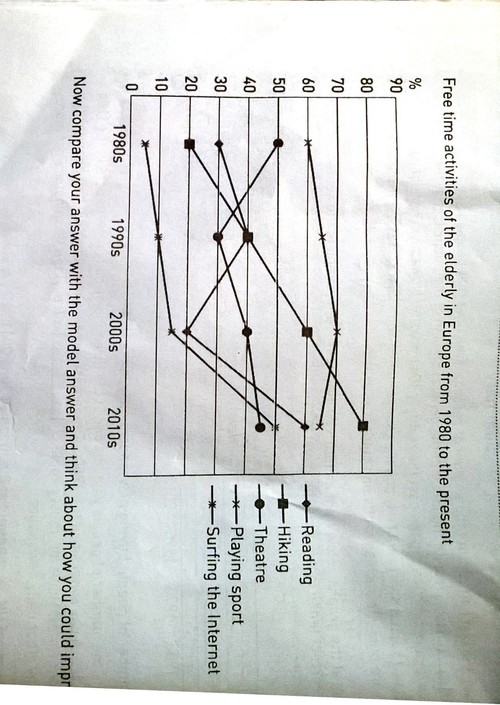free time activities among older generation
The line graph gives information about kinds of free time activities that elderly people in Europe do from 1980s to 2010s. Overall, the rate of hiking increased significantly. On the other hand, playing sport remained the most stable compared to others.
In the period between 1980s and 1990s, all activities increased considerably, only theatre dropped sharply, from 50% in 1980s to 30% in 1990s. Among five activities, playing sport is the most common one with the rate of more 60%. Mean while, surfing the Internet is the lowest with only around under 10% of the graph.
Over the 20-year period, the rate of all five activities changed dramatically. In 2010s, the rate of hiking reached the highest point, at 80% and became the most popular activity. At the same time, surfing the Internet also had an impressive increasing, from only 10% in 1990s to 50% in 2010s. Additionally, the fluctuation of reading can be noticed when it reached the lowest point, at 20% in 2000s but grew immediately in the next 10 years with the rate of 60%. Even though the percentage of playing sport decreased in 2010s but not remarkable and theatre was thought to be the most stable among five activities.
The line graph gives information about kinds of free time activities that elderly people in Europe do from 1980s to 2010s. Overall, the rate of hiking increased significantly. On the other hand, playing sport remained the most stable compared to others.
In the period between 1980s and 1990s, all activities increased considerably, only theatre dropped sharply, from 50% in 1980s to 30% in 1990s. Among five activities, playing sport is the most common one with the rate of more 60%. Mean while, surfing the Internet is the lowest with only around under 10% of the graph.
Over the 20-year period, the rate of all five activities changed dramatically. In 2010s, the rate of hiking reached the highest point, at 80% and became the most popular activity. At the same time, surfing the Internet also had an impressive increasing, from only 10% in 1990s to 50% in 2010s. Additionally, the fluctuation of reading can be noticed when it reached the lowest point, at 20% in 2000s but grew immediately in the next 10 years with the rate of 60%. Even though the percentage of playing sport decreased in 2010s but not remarkable and theatre was thought to be the most stable among five activities.

notebook_image_61905.jpg
